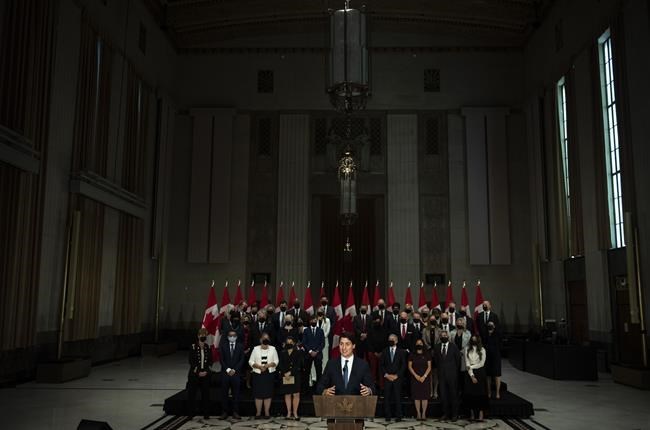OTTAWA — Prime Minister Justin Trudeau says his cabinet ministers need to focus on tangible results and not lose sight of the government's broader goal of creating a more diverse and inclusive Canada, even as Omicron is threatening to push the transition from pandemic to recovery down the road yet again.
Trudeau sat down Thursday for an interview with The Canadian Press, a few hours after the mandate letters for his latest cabinet were finally published. The letters, 38 in all, indicate while ending the pandemic remains the top priority, the government needs to get back to focusing on the rest of its agenda.
Climate change, ending systemic discrimination and inequality, and reconciliation are efforts that cross government departments, and are among the problems he said can only be solved by delivering results Canadians can actually feel.
"As we move forward to continue to work to apply the lessons of how quickly a government can respond and help people in time of crisis we have to make sure we're actually delivering in ways that are tangible," he told The Canadian Press.
As such, he is directing each minister to come back to him with a plan showing how they intend to meet each directive given to them, such as bringing in an external oversight process for handling sexual misconduct investigations in the Canadian Armed Forces, bolstering national resilience and readiness for future pandemics and other emergencies, and developing the government's latest plan to combat the "existential threat" of climate change.
He is also ordering them to publicly report on their progress.
Trudeau said that's not just about marketing the fact that $10 million was spent on a program, but showing evidence of what that $10 million actually did.
"(That) is something that government doesn't think deliberately enough about and that's certainly something we're trying to change," he said.
Trudeau started publishing mandate letters after the Liberal government came to power in 2015, which at the time was unprecedented for a federal government in Canada. Two years later, the Privy Council Office set up a website to track progress on the commitments in the letters. It has not been updated since before the 2019 election.
Trudeau is in his sixth year in office, but COVID-19 has repeatedly interrupted the government's agenda over the last two years.
But the prime minister said the pandemic cannot throw everything off course, even though the Omicron variant is introducing new threats to health and the economy.
"This decade has had an incredibly difficult start, but this is the moment to rebuild a more resilient, inclusive and stronger country for everyone," Trudeau said in the opening paragraphs that topped each mandate letter.
In addition to directives to all to address systemic inequities and racism across government, the letters order every minister to take the time to implement the United Nations Declaration on the Rights of Indigenous Peoples in their departments.
"This year, Canadians were horrified by the discovery of unmarked graves and burial sites near former residential schools," Trudeau wrote.
"These discoveries underscore that we must move faster on the path of reconciliation with First Nations, Inuit and Métis Peoples. We know that reconciliation cannot come without truth and our government will continue to invest in that truth."
Legislation providing the road map for doing that passed last spring and Justice Minister David Lametti is being directed to prioritize the implementation of that law and appoint a special interlocutor to further "advance justice" on unmarked graves and address the legacy of residential schools.
Finance Minister Chrystia Freeland has already knocked off a handful of her mandate orders this week in the fall economic statement, including money to improve ventilation projects in schools and small businesses, expanding a tax credit for teachers who buy classroom supplies to include technology and extending some pandemic benefits for workers and hard-hit industries like tourism.
Freeland is also instructed to champion the adoption of a global minimum standard on carbon pricing, a push Trudeau started this fall at the United Nations climate talks in Scotland.
In question period on Thursday, Opposition Conservative Leader Erin O'Toole asked why inflation was not included in Freeland's letter, to which she responded that Canada's GDP grew 5.4 per cent in the third quarter of 2021 and it has recouped all the jobs lost during the pandemic.
Acknowledging the weight of repeated sexual misconduct allegations harming Canada's military, Defence Minister Anita Anand is asked to diversify her department in a bid to bring "meaningful and lasting change" to the country's Armed Forces.
The letter to Health Minister Jean-Yves Duclos is heavily laden with pandemic responses, but also restores the idea of working with the provinces to create a national pharmacare program. That idea, a priority for the NDP, has been discussed before but was not included in the government's election materials this fall.
In Foreign Affairs Minister Mélanie Joly's letter, the word "China" is not mentioned, but she is mandated to develop and launch a comprehensive Indo-Pacific strategy to deepen diplomatic, economic and defence partnerships and international assistance in the region.
This report by The Canadian Press was first published Dec. 16, 2021.
Mia Rabson, The Canadian Press



